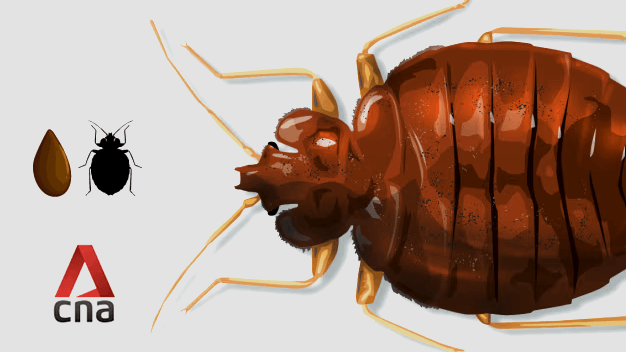
IKARI Team featured on Channel News Asia sharing tips on How to check for bedbugs when you travel – and avoid bringing them home.
October 12, 2023
“Bedbug Anxiety” IKARI Director featured in New York Times
June 8, 2024IKARI team sharing tips on picking mosquito repellents in The Straits Times

Photo by Straits Times
IKARI’s entomologist Leon Tan recently shared some tips with The Straits Times what to look out for when picking mosquito repellents during this dengue season.
Below, you can find an exclusive extended FAQ that he has created to share more detailed information on picking out mosquito repellents not in the article!
1. What attracts mosquitoes to bite people, and why are some people more prone to getting bitten by mosquitoes than others?
Mosquitoes are attracted to humans by a combination of factors, including body heat, body odor (such as sweat and carbon dioxide), and certain chemicals emitted by the skin. Some people may be more prone to mosquito bites due to genetic factors, blood type, metabolic rate, and even clothing color, which can influence attractiveness to mosquitoes.
2. How do the various popular methods of repelling mosquitoes work?
Mosquito repellents work by creating a barrier that makes it difficult for mosquitoes to detect and land on human skin. Common repellents contain active ingredients such as DEET, picaridin, or plant-based oils like citronella or eucalyptus. These substances interfere with the mosquito’s ability to detect human scent or disrupt its sensory organs. Electrical devices, such as mosquito traps or zappers, use attractants to lure mosquitoes into a trap or kill them upon contact.
3. What is the most and least effective repellent product?
The most effective repellent products typically contain DEET, picaridin, or IR3535 as their active ingredients. These substances have been extensively tested and proven to provide long-lasting protection against mosquitoes. Least effective repellents may contain weak concentrations of active ingredients or use ineffective formulations that do not provide adequate protection.
4. Is there a difference between repellents marketed for mosquitoes and those meant for other insects?
Repellents marketed specifically for mosquitoes are formulated to target the sensory mechanisms and behaviors of mosquitoes, such as their attraction to human odor and heat. While some repellents may offer cross-protection against other insects, such as flies or ticks, specific formulations may be optimized for different types of pests.
5. Is home fogging recommended as a way to keep mosquitoes away?
Fogging can only be conducted outdoors due to the potentially dangerous fumes that are emitted during the process. Fogging is also not recommended as the only treatment method as fogging only kills adult mosquitoes present at that time, and also insects that prey on them. Most of the time, the adult mosquitoes simply move away to the neighbouring areas during fogging. There have been numerous academic articles in which experts have talked about its ineffectiveness at holistic control.
6. What is DEET, and are there concerns with its use in repellents? What is the safe/effective concentration of DEET in such products for adults and children?
DEET (N,N-diethyl-meta-toluamide) is a widely used insect repellent known for its effectiveness against mosquitoes and other biting insects. Concerns about DEET primarily revolve around potential skin irritation or allergic reactions, as well as safety concerns regarding prolonged or excessive exposure, particularly in children. The American Academy of Pediatrics recommends DEET concentrations of 10-30% for children over two months old and up to 50% for adults, applied sparingly and as directed. The safest way is to read the label on the repellent and apply accordingly. Perhaps one other concern users might have would be its effect on the environment. DEET may be washed into wastewaters or into drains during rains. Although it is known to have a prolonged stay within water bodies, it is however not overly toxic to aquatic wildlife such as fish and water birds. According to Hazardus Substances Data Bank (HSDB), DEET does not acumulate upwards the food chain, meaning there is little to no harm of secondary or tertiary consumers being affected.
Click here to access more info about DEET
7. Are natural repellents, such as those with citronella or lemongrass, safer and/or more effective than those using chemicals?
Natural repellents, such as those containing citronella or lemongrass oils, are often perceived as safer alternatives to chemical repellents. While natural repellents may offer some protection against mosquitoes, their effectiveness and duration of protection may vary compared to chemical alternatives like DEET or picaridin. Additionally, natural repellents need to be reapplied more frequently to maintain efficacy.
8. Besides repellents, what are the most effective ways of keeping mosquitoes away?
Besides repellents, effective ways of keeping mosquitoes away include eliminating standing water breeding sites, using mosquito nets or screens, wearing long-sleeved clothing and pants, and avoiding outdoor activities during peak mosquito activity times (dawn and dusk). If unsure, please contact us at IKARI to ensure that there are no breeding sites and customise a treatment plan with long term effectiveness as we have have access to professional tools and solutions not available to the general public such as in2care.


